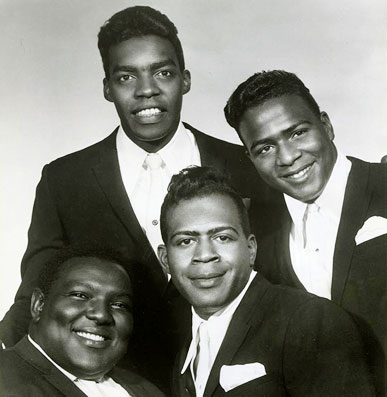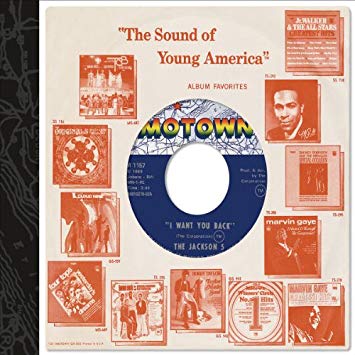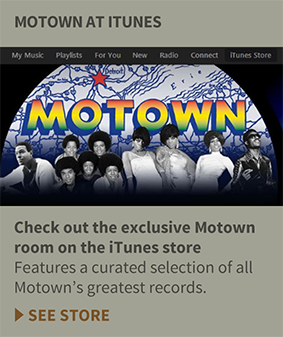One of the more underappreciated vocal groups of their era, the Fantastic Four created Shakespearean Soul with “The Whole World Is A Stage,” “Romeo And Juliet’s ‘I Don’t Want To Live Without You (Play)’” and “Goddess Of Love” for local Motown rival label Ric-Tic. Powered by impassioned lead singer “Sweet James” Epps, they came to Motown as established R&B hitmakers in 1968. Although their career somewhat stalled for two years at Hitsville, they release strong singles, record an unreleased album and a passel of additional tracks still prized by Motown collectors and Northern Soul aficionados.
FAST FACTS:
- Biggest Hit: “The Whole World Is A Stage”; for Motown, “I Love You Madly.”
- First Hit: “The Whole World Is A Stage.”
- Biggest Album: Alvin Stone (The Birth And Death Of A Gangster); for Motown, The Best Of The Fantastic Four.
- Career Highlight: The Fantastic Four’s string of memorable mid-Sixties singles on Ric-Tic Records perform well on the R&B charts and soul music radio, making them the label’s best selling act – even bigger than Edwin Starr – leading up to their Motown tenure.
- Starting out in the early 1960s after Detroit teenager Ralph Pruitt overhears Epps’s singing voice, the Fantastic Four eventually coalesce around Epps, Ralph Pruitt, his brother Joe, and Wallace “Toby” Child. They polish their sound and sign with Ed Wingate’s Golden World/Ric-Tic Records, a small outfit producing some big-sounding tracks thanks in no small part to moonlighting members of Motown’s Funk Brothers house band and backup singers, the Andantes.
- Recording for Wingate’s Ric-Tic label, the quartet consistently connects with fans through a string of singles with devotional lyrics – some echoing themes of classical literature – perfectly suited for “Sweet” James’s near-breathless and deeply soulful delivery, which bears some resemblance to that of David Ruffin. They place six songs on the R&B charts (three of which also hit the pop charts) between early 1967 and mid-1968 – most produced by Al Kent – and with “The Whole World Is A Stage,” “You Gave Me Something (And Everything Is Alright),” “As Long As I Live (I Live For You)” “To Share Your Love,” the majestic “Goddess Of Love,” the subtle funk of “A Man In Love” and the feverish “I’ve Got To Have You” they become a regular presence on soul music-formatted radio stations.
- Wingate sells off much of his operation to Gordy in 1966, but he keeps the Ric-Tic label and the Fantastic Four. But as the quartet releases “I Love You Madly” in 1968, Berry acquires the remainder of Wingate’s record business and quickly re-presses the song to his Soul label, where it peaks at Number 12 on the R&B chart and 53 on the Pop chart.
- The next Fantastic Four single, “I Feel Like I’m Falling In Love Again” – their first completely Motown production – comes out in March 1969 and, although it has all the earmarks of a hit recording, produced by Jimmy Ruffin’s team of William Witherspoon and James Dean, it fails to chart. That same month, Motown compiles 11 songs originally released as Ric-Tic singles for the album The Best Of The Fantastic Four, which comes out on the Soul label. The versions on this LP are stereo mixes; some have missing elements or are different performances to the original hits.
- Motown brings Al Kent in to try to get a hit on the Fantastic Four, releasing his production of “On The Brighter Side Of A Blue World” in April 1970, which stands as the group’s final single release for Motown. Along with “I Feel Like I’m Falling In Love Again,” “Just Another Lonely Night” and nine other memorable tracks, Motown plans to include it on an album called How Sweet He Is, which is given a Soul label catalog number. But the company leaves the album in the vault.
- Fantastic Four disbands in frustration, but a few years later reforms with a slightly different lineup to sign with Westbound/Eastbound Records, where they return to the charts as a disco group, their biggest hit being “Alvin Stone (The Birth And Death Of A Gangster)” in 1975.
- A few of the Fantastic Four’s unreleased Motown tracks begin to appear on compilations in the CD era and in June 2015 the U.K. reissue label Ace Records, through its Kent imprint, issues The Lost Motown Album, which includes the afore-mentioned abandoned LP along with 13 bonus tracks.






